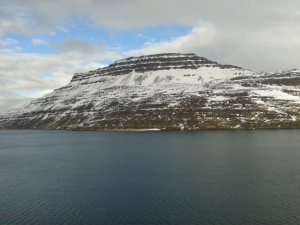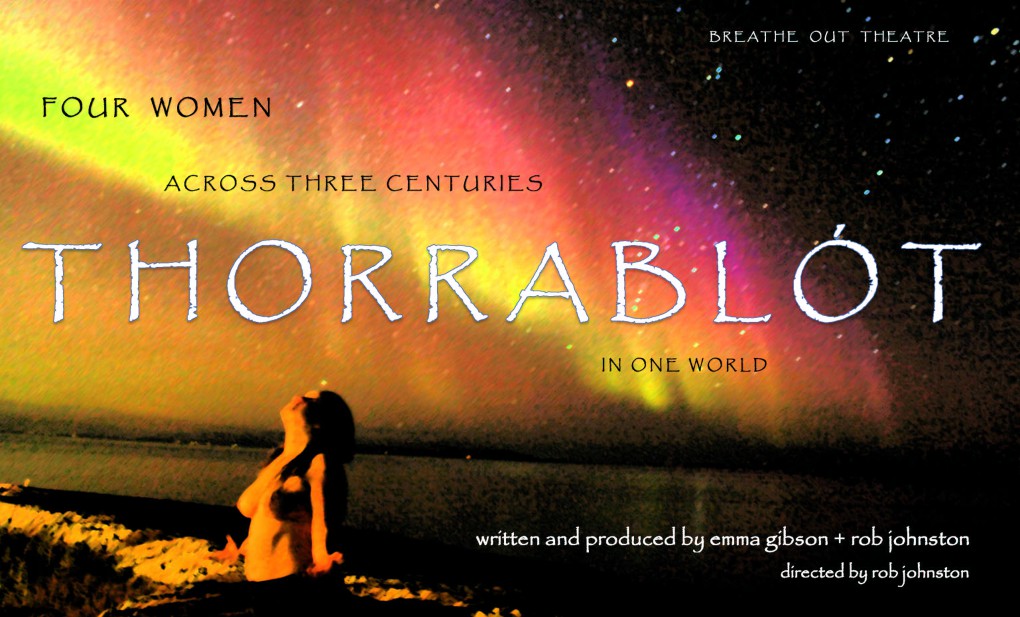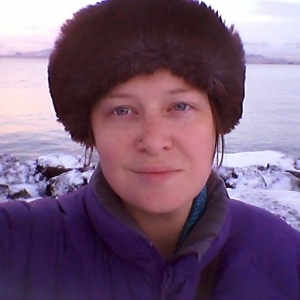A quick update from Emma, who is travelling in Iceland, seeking out more research and inspiration. After all, Emma and Rob are no good at actually writing while in the same country.
Author: emmajgibson
Four women + two writers…
 One of Thorrablot’s themes is the way we interact with the planet and our place in the world’s fragile and changing ecology.
One of Thorrablot’s themes is the way we interact with the planet and our place in the world’s fragile and changing ecology.
Emma and I both have some background and interest in the environment through our past and current day-jobs. In Canberra Emma worked for an Australian government agency responsible for renewable energy development. During my years scraping by as a (not-too-successful) engineer I worked on a few renewable energy projects. One of them was even for a little bunch of crooks called Enron – though no one knew they were crooks at the time (honest!). Not longer after I left Enron they went on to post the biggest corporate loss ever. (Maybe I should’ve have added a bit more onto my final expenses claim …?) I now tutor an Environmental Studies course for The Open University when not co-writing plays about the environment.
We both had a common view of where people fit into the global ecological debate and wanted the play to explore a wider picture than the one we seemed to be getting. This wasn’t going to be a play about how we should all drive smaller cars, switch off lights after ourselves, and stop using plastic-bags. Based on our own experiences working in sustainability we felt those discussions were ultimately leading nowhere very much, except into ever-diminishing circles.
We wanted to explore how huge ecological events have had an impact on the world and how such events are becoming ever more significant to our continued survival as a race. But told through the lives of individuals. It also seemed important early on – and now seems more important – that those individuals were women. Which is how Thorrablot has developed into a story of ‘four women across three centuries’, as the poster tells us.
From the starting point we follow Lief, a soothsayer living in the 17th Century; through to Helen who is living on a small farm during Manchester’s Industrial Revolution; on to Freyja, a weathergirl in a North Atlantic island nation a few years from now; and finally decades later to Ann, a Manc geologist investigating a recently active volcano off the coast of the same island. Their stories are still being written, talked about, taken apart, rearranged, put back together, looked at again. Emma and I are still enjoying the process – and surviving each other! (We are acting as dramaturgs on each other’s writing…) And we still have the very enjoyable prospect of casting, rehearsing, designing, and sharing the show to come. What a nice way to spend a summer!
Rob
Where it all began…
As we continue developing the script, here’s a short video from us on location in the café where the idea for this play was first hatched. Dramatic volcano noises courtesy of the coffee machine.
Video update from Rob
Feasting at Thorrablót
While in Iceland I had many research-related adventures. I consulted a soothsayer, learned about the Hidden Folk, and interviewed with a chef while he butchered a seal (accidental by-catch given to him by some fishermen, so he filleted it for steak, boiled the bones for soup and sent the pelt to a tannery so none of the animal was wasted).
But the biggest highlight was attending Thorrablót.
So imagine you brace the icy wind to arrive at the community hall. It’s packed full, with probably half of the village’s 500 inhabitants present. On arriving, after finding places to hang your coats and outer layers, you are offered an aperitif of fermented shark and Brennivan.
Brennivan, also known as Black Death, is a spirit similar to vodka or aquavit, made from potato and caraway seeds and is traditionally used to wash down the shark – chewy cubes that almost look like tofu and to begin with, are vaguely like very stinky ripe cheese, but then an aftertaste develops, something like ammonia… and this is where the Brennivin becomes important!
Inside, the buffet is piled high with delicious/disgusting delicacies. Sheep smoked in its own dung, soured sheep, lamb jelly (made from singed sheep’s cheek), whole sheep head (including the eye, which is surprisingly delicious), blood sausage, harðfiskur (dried fish, best consumed smeared with butter), pickled cabbage, mushy peas, mashed potato and rye bread. If you’re feeling particularly adventurous, you might also try the whale blubber and the ram’s testicles fermented in whey (which I abstained from because it smelled like a lot like a dirty dishrag).
There’s more about the food and tradition of Thorrablót here.
Rob and I decided on Thorrablót for the play’s title because as well as providing a setting, much of which takes place on a mid-winter night, the feast connects tradition and modernity. These days most Icelanders are more likely to eat hotdogs or pizza than the traditional foods. Many of the younger people I met had an intense dislike for some of the sour, fermented dishes served as part of the feast – the foods necessary for survival for the long winters of the past before modern conveniences. With the coming of spring people could feast on their surplus winter rations. So in a way, Thorrablót is a reminder of this past, and an appreciation of the options available today. As well as this, it’s an opportunity for the community to come together and celebrate the passing of mid-winter. After the feast, we enjoyed entertainment including sing-a-longs, satirical speeches, a play made up of sketches that ‘roast’ well-known members of the community, live music and lots of dancing. While today’s Thorrablót celebrations have no doubt changed since the ancient sacrificial rites to the winter gods, the Vikings know how to have a party.
Next time on the Thorrablog, we’ll be hearing from Rob.
Over and out!
Emma
Welcome to our Thorrablog!
This is where we’ll be sharing our journey during the research and development of our new play Thorrablot.
This play tells the stories of four women, across different time periods and places who find themselves caught in conflict between civilisation and nature. Thorrablot explores the impact of industrialisation on climate change, linking through history to a cataclysmic ecological event.
We’ve received R&D funding from the Arts Council England to work on this, our second collaboration, and later in the year will be workshopping with actors and sharing the work in progress.
You might be wondering what Thorrablot means? We took the title from the name of a traditional midwinter feast that takes place in Iceland as a sacrifice to the pagan gods. Þorrablót has similarities to a Scottish Burns Night where the community comes together for a night of storytelling, music and revelry – and of course some traditional food, most of which is arguably quite disgusting, but more on that another time!
Emma and Rob
Our previous work
Rob and Emma first joined forces to write War Stories, an international collaboration between Manchester’s 24:7 Theatre Festival and Canberra’s You Are Here Festival.
Following the 2014 24:7 festival, War Stories was selected for Re:play 2015. We also had the opportunity to present a workshop as part of Re:play on writing collaboratively.
We had so much fun we decided to do it again. We just had to find the right idea…
About Emma
Emma Gibson is a playwright hailing from Canberra. Her work has been performed across Australia and internationally. Her play Bloodletting won the Bread and Roses 2015 playwriting competition and will hit the stage in September. War Stories was written with Rob for 24:7 and You Are Here and went on to Re:play 2015. Widowbird was presented at the Women Playwrights International Conference in Stockholm. Treeful of Tragical Tales had a staged reading at La Mama E.T.C, New York. Grief Eaters was longlisted for the BBC writer’s room. Emma’s produced works include Johnny Castellano is MINE (2014 Canberra Critics Circle Award), The Pyjama Girl, Dead Beauty Queens, Widowbird and Love Cupboard.
About Rob
Rob Johnston is a Manchester based writer-producer with 25+ productions across the UK. Einstein’s Daughter won The Kings Cross Award for New Writing, while Under My Skin (to be restaged in Nov 2015) was shortlisted for The Channel Four Comedy-Drama Award. Kafkaesque and War Stories were in The Re:play Festival, celebrating Manchester independent theatre. Four youth theatre plays have been staged at Oldham Coliseum. Spring Reign, exploring the Syrian revolution, and which recently sold out at The Lowry, is being developed by Benedict Power Productions for a 2016 UK tour. Rob is currently in pre-production on the Arts Council funded The Human Touch for 2016.
Responses to War Stories
“It was as quietly moving as anything else I’ve seen on World War One … The audience’s taut silence validates the work.” Manchester Confidential
“Beautifully balances direct narrative delivery to the audience and storytelling skills, with emotional expressiveness and impressive restraint.”
The Observer
“An excellent two-hander… Definitely one to look out for, even if you think you have had your fill of WWI commemorations.”
The Good Review ★★★★★
“The beauty is that Johnston gives insight into what makes Bernard tick and, likewise, Gibson understands the way of thinking of an Aussie nurse as personified by Elsie. The actors pick this up to bring the writers’ intentions to life.” Remote Goat ★★★★


